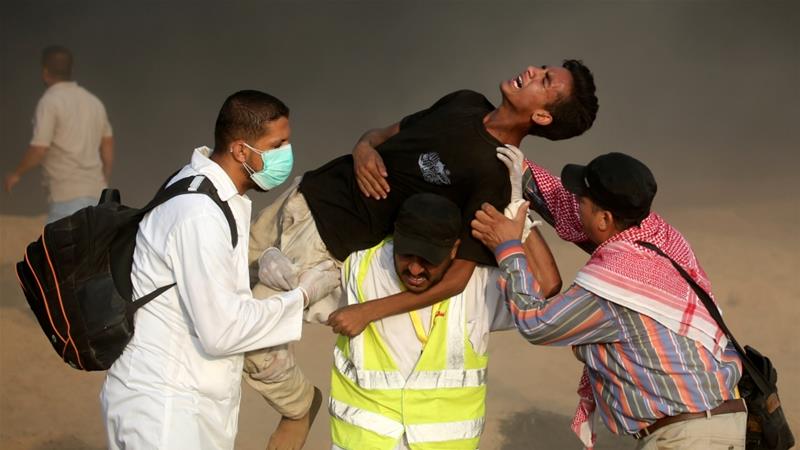The Past Six Months in Gaza Have Been like another War
PALESTINE - ISRAEL, 8 Oct 2018
Mohammed Abu Mughaiseeb – Al Jazeera
I am a doctor in Gaza and I have never seen anything like this before.

Medics carry a wounded man during a protest, demanding Palestinians’ right to return to their homeland, at the fence between Israel and Gaza on August 31, 2018. [Reuters/Ibraheem Abu Mustafa]
1 Oct 2018 – As a doctor living and working in Gaza all my life, I thought I had seen it all. I felt I knew the limits of what Gaza can endure.
But the last six months have been the most difficult I have experienced in my 15 years with MSF in Gaza. And I have lived and worked through three wars: in 2008, 2012 and 2014.
The human suffering and devastation I saw over the past few months have reached another height. The shocking volume of wounded has been overwhelming.
I will never forget Monday, May 14. In the span of 24 hours, the local health authorities recorded a total of 2,271 wounded, including 1,359 people injured by live ammunition. I was on shift that day with the surgical team of al-Aqsa hospital, one of the main hospitals in Gaza.
At 3pm we started receiving the first wounded from the demonstration. More than 300 arrived though the doors in less than four hours. I had never seen so many patients in my life.
Hundreds were lining up to get into the operating theatre; the corridors were full; everyone was crying, shouting and bleeding.
No matter how hard we worked, we could not cope with the huge number of injured. It was too much. Gunshot after gunshot, our team worked for 50 hours straight trying to save lives.
It brought back the memories of the 2014 war. But really, nothing could have prepared us for what we saw on May 14. And what we are still seeing today.
Each week new trauma cases continue to arrive, the majority of them young men with gunshot wounds to their legs with high risk of life-changing disabilities. MSF’s cohort of patients continues to grow and right now we are treating about 40 percent of all those wounded by gunshots in Gaza, who are over 5,000 people.
But the more we advance in treating these gunshot injuries, the more we see the complexity of what has to be done. It’s difficult, medically and logistically. The medical structures in Gaza are crumbling under the high demand for health services and ongoing shortages; a large proportion of the patients need specialised limb reconstructive surgical intervention, which means multiple surgeries. Some of these procedures are not currently possible in Gaza.
What terrifies me the most is the risk of infection. Osteomyelitis is a deep infection of the bone. If it goes untreated, it can lead to wounds that do not heal and increase the risk of amputation. These infections need to be treated urgently because they worsen quickly if medication is not introduced.
But the infection is not easy to diagnose and there is currently no structure in Gaza for analysing bone samples to identify it. MSF is working to set up a microbiology laboratory here, providing supplies and training, in order to be able to test bone samples for osteomyelitis. But once we are able to identify the infection, treatment requires a long and complex course of anti-biotics for each patient and repeated surgical intervention.
As a doctor, I travel all over the Gaza strip and I see more and more young men on crutches with external fixators on their legs or in wheelchairs. It’s increasingly becoming a normal sight. Many of them try to be hopeful and persevere, but I, as a doctor, know that their future is bleak.
One of the most difficult things in my work is having to talk to patients, most of them young men, knowing that they could lose their leg as a result of a bullet that has shattered their bones and future. Many of them ask me “Will I be able to walk freely again?”
Facing this question is very hard for me because I know that due to the situation we are working in, many of them will not be able to walk normally again. And it is my responsibility to tell them that we are doing our best, but the risk of them losing the injured leg is high.
To tell this to a young man with his life ahead of him is really difficult. And it’s a conversation I have had to have many times in recent months.
Of course, we continue to try to find a way to treat these people despite the hardships we face: overwhelmed hospitals and, because of the blockade, four hours of electricity a day, fuel shortages, depleted medical supplies, a lack of specialist surgeons and doctors, exhausted nurses and medics who have not being paid their full salaries for months on end, restrictions on patients leaving Gaza to receive medical treatment elsewhere and the list goes on.
This, while the socioeconomic situation around us continues to deteriorate on a daily basis. Now we see children begging in the street – something we never saw a year or two ago.
MSF is facing huge challenges and we cannot do it alone. We try. We push. We have to keep going. For me, it’s a question of medical ethics. These injured people must get the treatment they need.
Right now in Gaza, looking into the future is like looking into a dark tunnel and I’m not sure I can see a light at the end of it.
______________________________________________________
More on Gaza:
- Israel to reduce Gaza fishing zone by one-third
- Sinwar: Another war with Israel not in Hamas’s interest
- Gaza protests: All the latest updates
- Gaza: Teen killed by Israeli tear gas canister
 Dr Mohammed Abu Mughaiseeb is a Palestinian doctor and an MSF medical referent in Gaza.
Dr Mohammed Abu Mughaiseeb is a Palestinian doctor and an MSF medical referent in Gaza.
Go to Original – aljazeera.com
Join the BDS-BOYCOTT, DIVESTMENT, SANCTIONS campaign to protest the Israeli barbaric siege of Gaza, illegal occupation of the Palestine nation’s territory, the apartheid wall, its inhuman and degrading treatment of the Palestinian people, and the more than 7,000 Palestinian men, women, elderly and children arbitrarily locked up in Israeli prisons.
DON’T BUY PRODUCTS WHOSE BARCODE STARTS WITH 729, which indicates that it is produced in Israel. DO YOUR PART! MAKE A DIFFERENCE!
7 2 9: BOYCOTT FOR JUSTICE!
DISCLAIMER: The statements, views and opinions expressed in pieces republished here are solely those of the authors and do not necessarily represent those of TMS. In accordance with title 17 U.S.C. section 107, this material is distributed without profit to those who have expressed a prior interest in receiving the included information for research and educational purposes. TMS has no affiliation whatsoever with the originator of this article nor is TMS endorsed or sponsored by the originator. “GO TO ORIGINAL” links are provided as a convenience to our readers and allow for verification of authenticity. However, as originating pages are often updated by their originating host sites, the versions posted may not match the versions our readers view when clicking the “GO TO ORIGINAL” links. This site contains copyrighted material the use of which has not always been specifically authorized by the copyright owner. We are making such material available in our efforts to advance understanding of environmental, political, human rights, economic, democracy, scientific, and social justice issues, etc. We believe this constitutes a ‘fair use’ of any such copyrighted material as provided for in section 107 of the US Copyright Law. In accordance with Title 17 U.S.C. Section 107, the material on this site is distributed without profit to those who have expressed a prior interest in receiving the included information for research and educational purposes. For more information go to: http://www.law.cornell.edu/uscode/17/107.shtml. If you wish to use copyrighted material from this site for purposes of your own that go beyond ‘fair use’, you must obtain permission from the copyright owner.
One Response to “The Past Six Months in Gaza Have Been like another War”
Read more
Click here to go to the current weekly digest or pick another article:
PALESTINE - ISRAEL:
The cruelty of the occupiers is hard to comprehend, and the essay in TMS today on this topic reminds us of the kind of people who are now in charge of so many “democracies”. How can anyone with a family, loved ones, friends, parents bear to behave this way to those it has decided are to be treated as enemies? How can they be taught that this is the way to treat any human being ? Is there no common humanity they can use to try some sort of human contact?